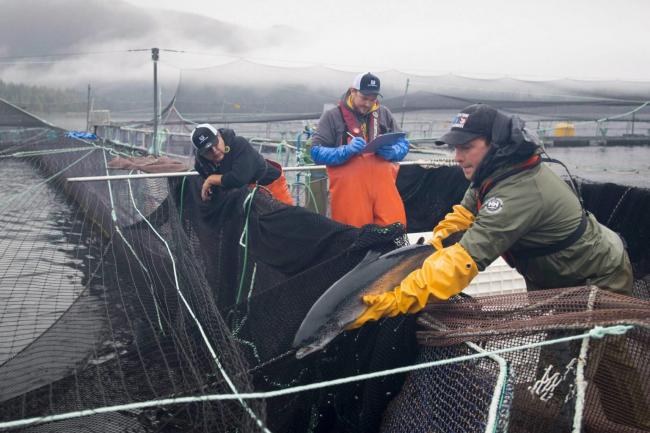Articles Menu

Feb. 17, 2023
Fisheries Minister Joyce Murray has announced the federal government will not renew licences for 15 open-net Atlantic salmon farms around British Columbia’s Discovery Islands.
Murray says in a news release the Discovery Islands area is a key migration route for wild salmon where narrow passages bring migrating juvenile salmon into close contact with the farms.
She says recent science indicates uncertainty over the risks posed by the farms to wild salmon, and the government is committed to developing a responsible plan to transition away from open-net farming in coastal B.C. waters.
Open-net fish farms off B.C.’s coast have been a major flashpoint, with environmental groups and some Indigenous nations saying the farms are linked to the transfer of disease to wild salmon, while the industry and some local politicians say thousands of jobs are threatened if operations are phased out.
“I have to take into account the plight of wild salmon, which are in a state of serious decline,” she said in an interview Friday.
She said the decision came after extensive consultations with First Nations, the industry and others, and the department is taking a “highly precautionary” approach to managing salmon farming in the area.
Murray said she called First Nations and industry representatives Friday before announcing what she said was a difficult but necessary decision to protect wild salmon from the potential risks posed by farmed fish.
“There have been some assessments from DFO that suggest minimal risk and there’s also been science since that main assessment that has been suggesting that there may well be risk from the viruses and sea lice from the farms,” she said.
In the news release she says there are multiple stressors on wild salmon, including climate change, habitat degradation and both regulated and illegal fishing.
Murray’s mandate letter from Prime Minister Justin Trudeau tasked her with developing the plan to shift from open-net salmon farming in B.C. waters by 2025, while working to introduce Canada’s first Aquaculture Act.
Fisheries and Oceans said last summer that open-net salmon farms may continue operating during a consultation process that’s currently underway, with the final plan to transition 79 farms expected to be released later in the year.
The federal government announced in December 2020 that it would phase out 19 Atlantic salmon farms in the Discovery Islands area of Vancouver Island.
It also said fish farm licences would not be renewed.
Former B.C. premier John Horgan sent a letter to Prime Minister Justin Trudeau last March saying there is widespread concern the federal government is poised to make a decision that could threaten hundreds of jobs and the economies of coastal communities.
Horgan urged the prime minister to assure the salmon farming sector that an appropriate transition program will be implemented and must include First Nations and communities that rely on fish farms economically.
The B.C. Salmon Farmers Association has said an economic analysis concluded the province could lose more than 4,700 jobs and up to $1.2 billion in economic activity annually if salmon farm licences are not renewed.
But B.C.’s First Nations Wild Salmon Alliance says more than 100 First Nations support the federal government’s plan to transition away from open-net salmon farms.
Alliance spokesman Bob Chamberlin said earlier wild salmon runs are suffering and decisions must be made to help stocks rebound.
RELATED: Union of BC Indian Chiefs want more action on fish farm closure from the feds
RELATED: B.C. fish farm licences outside Discovery Islands renewed until at least spring 2023
[Top photo: Aquatic science biologist Shawn Stenhouse releases a Atlantic salmon back into its tank during a Department of Fisheries and Oceans fish health audit at the Okisollo fish farm near Campbell River, B.C. Wednesday, Oct. 31, 2018. A Liberal promise to transition salmon farms in British Columbia from ocean net pens to closed containment systems in just over five years is being slammed as careless by the aquaculture industry but applauded by a wild salmon advocate who says the sooner the better. THE CANADIAN PRESS /Jonathan Hayward]